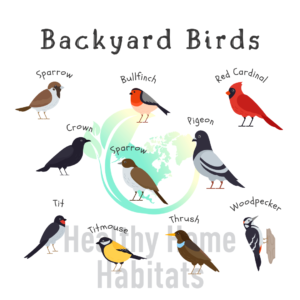 I’m still waiting for the songbirds this spring. Maybe you have noticed fewer songbirds in your neighborhood too? Did you know that there are two, simple changes you can make to your home landscaping that will help? Just these two, new choices will increase the number of both healthy adults and baby birds in your home landscape for years to come.
I’m still waiting for the songbirds this spring. Maybe you have noticed fewer songbirds in your neighborhood too? Did you know that there are two, simple changes you can make to your home landscaping that will help? Just these two, new choices will increase the number of both healthy adults and baby birds in your home landscape for years to come.
Two Simple Choices
The good news is that while there are many steps we can take to improve the general health, ecological diversity and seasonal interest in our own front and back yards, there are two choices, the easiest in my opinion, that will have the greatest impact on local bird populations. The first is to bring all, and I mean ALL, of your pesticides to your local community’s spring, Household Hazardous Waste day for safe disposal. The second is to buy and plant a native shrub border along your front and back yards, providing safe bird nesting locations and the best source of their natural fall and winter food: berries.
National Audubon Society article: “More Than Half of U.S. Birds Are in Decline, Warns New Report”
Maybe you’ve also seen the National Audubon Society’s 2022 State of the Birds report which states that “the United States and Canada have lost more than 3 billion birds in the past 50 years. “We’re basically watching the process of the sixth mass extinction,” says Marra, who is a co-author of the 2019 paper.” These numbers are upsetting for many reasons. Indeed, we are reminded of how linked our human wellbeing is to theirs when we add that “New research from King’s College of London has found that seeing or hearing birds is associated with an improvement in mental wellbeing that can last up to eight hours.”
No More Poisons At Or In Our Homes
Pesticides include all of the herbicides, insecticides, nematicides, molluscicides, rodenticides, and other “…cides”, aka, poisons, that we commonly buy in colorful packaging at our local garden centers. Corporate marketing told us for decades that these poisons were a good idea when we valued perfect leaves and flowers more than our own health or having songbirds. Now we know better. Perfect & poisoned leaves means poisoning the caterpillars that took a single bite of that leaf, and are then fed to baby birds by their mothers, killing them. Perfect leaves also means poisoning beneficial insects. You know, the food of adult birds as well as the pollinators (also beneficial insects) that bring us fruits, and vegetables.
Give Them What They Want, What They Really, Really Want!
The Cornell Lab of Ornithology tells us that “during the spring and summer months, most songbirds eat mainly insects and spiders…During fall and winter, however, birds that don’t migrate must eat fruits and seeds to survive.” So, #1 stopping the use of all landscape chemicals in our landscapes allows for more of the insects we need to feed our birds during the spring and summer. While, #2 planting a loose border of native shrubs, provides our birds with the exact nutrition they need for many fall and winters -without tempting bears and squirrels to feeders! Use your zip code to find native shrubs for your region at: https://www.audubon.org/native-plants
Two Choices
Here’s to simple choices that bring more songbirds into our landscape and lives for years to come!
